Editor:
Brandon Sweet
University Communications
bulletin@uwaterloo.ca
New leadership role in Office of the Associate Vice-President, Academic
A message from the Office of the Associate Vice-President, Academic.
The Office of the Associate Vice-President, Academic (AVPA) is seeking to fill the new position of Assistant Vice-President Academic (AsstVPA) — Academic Leadership and Strategic Initiatives starting January 2023 for a two-year term (with the possibility of renewal).
Responsibilities:
The AsstVPA — Academic Leadership and Strategic Initiatives (AsstVPA) will report to the Associate Vice-President Academic (AVPA) and be part of the leadership team in the AVPA office. The role has three primary areas of responsibility:
- Leading the Academic Leadership Program (ALP), which helps academic leaders (chairs, directors of academic units, associate chairs, associate deans) and aspiring leaders develop management and leadership skills and expand their knowledge of policy. This role will replace the role of Director, ALP and includes:
- Leading the ALP’s ongoing evolution to better meet the University’s needs and strategic priorities;
- Collaborating with subject matter experts as well as leadership and administrators within units, departments, and Faculties to deliver programming (e.g., workshops, lunch forums, coffee chats);
- Seeking information and staying informed about current issues relevant to academic leaders by consulting the professional literature and shared best practices.
- Leading, on behalf of the AVPA, projects undertaken in implementation of the University’s strategic plan.
- In year 1, this project will be redevelopment of the ALP to better suit the needs of the University and of faculty members who aspire to leadership roles. This project will include:
- Consultation with relevant campus stakeholders to identify areas of need;
- Developing onboarding/training for new Associate Deans, parallel to what is provided for Chairs;
- Working with other relevant units on campus, designing and implementing a mentorship program for aspiring academic leaders.
- In year 1, this project will be redevelopment of the ALP to better suit the needs of the University and of faculty members who aspire to leadership roles. This project will include:
- Serving as a designate on committees where a designate is an option and as a replacement at meetings when the AVPA is unable to attend.
Improving workplace injury compensation requires input from vulnerable workers

This article was originally published on Waterloo News.
Understanding the ways in which workers in precarious employment react to work injury and claims processes they see as unfair can help employers, legal representatives, physicians and others respond appropriately, according to a new study.
Precarious workers are defined as those who earn low or inconsistent wages. Often, they are uncertain how to access work compensation programs or are reluctant to speak up for fear of losing their jobs. The types of injustices faced by workers in the study included being laid off during a claim, receiving inadequate modified work or medical attention, employer claim suppression and unresponsive claim adjudicators.
“Precariously employed workers are vulnerable to unfair treatment and studies have shown that recent immigrants are over-represented in precarious employment,” said Ellen MacEachen, director of the School of Public Health Sciences and co-author of the study.
“When unfair treatment takes place, it has adverse repercussions on workers, affecting their mental health, quality of life and future success. By identifying unfairness and its behavioural and emotional effects, we can better understand the implication for workers’ compensation systems.”
For example, she said that being aware that if workers start out by being passive, it may be because they are confused about the process rather than because they don’t care about the injustice. Or knowing that being in the anger stage means that they may be motivated to fight back by pressuring those involved, taking matters into their own hands, or getting help from others. “Also, if a physician recognizes this pattern of behaviours, they can refer the worker to the appropriate resources and support at the right time.”
The findings of this study can help workers’ compensation systems communicate more effectively with injured workers about their needs during the claim process. The study identified a flowchart of reactions and emotions that occur as an employee is going through the worker compensation system, with the five emotions being: confusion, anger, unsupported, disappointed and determined. Policymakers can then use this information to address procedural unfairness in the system.
The study, which explored how injured workers in Ontario responded behaviourally and emotionally to procedural unfairness, was conducted between 2017 and 2021 with 36 adults proficient in English who had experienced a work-related injury in the last 10 years.
“This research leads to other questions to be studied: How pervasive is it for workers to quit their jobs after experiencing a work injury and procedural unfairness? What is the relationship between education about workers’ compensation and emotional and behavioural reactions of workers to perceived unfair claims processes?” MacEachen said. “Precarious workers are at risk of unfair treatment due to power and knowledge differentials between employers and workers, and there is still a lot left to be addressed.”
The study was published in the Journal of Occupational Rehabilitation and is co-authored by MacEachen, Nicole Billias and Sue Sherifali, all at Waterloo.
Stacey Watson and colleagues win best paper award
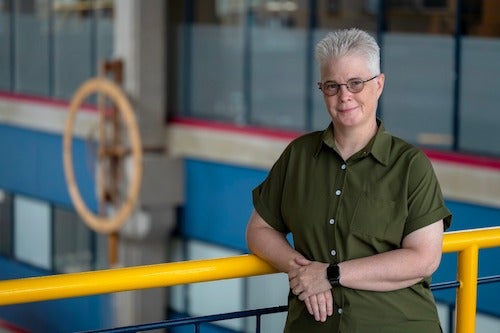
Stacey Watson is a lecturer at the Cheriton School of Computer Science. After five years in industry, which culminated in a role as a senior cybersecurity engineer, Stacey returned to academia to complete a PhD at the University of North Carolina at Charlotte. Before joining the University of Waterloo as faculty, Stacey was at the Rochester Institute for Technology in the Department of Computing Security.
This article was originally published on the School of Computer Science website.
Cheriton School of Computer Science Professor Stacey Watson, and their colleagues Manisha Kamarushi, Garreth Tigwell, and Roshan Peiris at Rochester Institute of Technology, have received a best paper award at MobileHCI 2022. Held annually, the ACM International Conference on Mobile Human-Computer Interaction will take place virtually and in person in Vancouver this year from September 28 to October 1.
Their paper, “OneButtonPIN: A single button authentication method for blind or low vision users to improve accessibility and prevent eavesdropping,” describes the development and evaluation of a secure authentication method that allows blind and low-vision users to enter a personal identification number on a smartphone securely while preventing potential adversaries from seeing or hearing the code entered on the device.
About this award-winning research
Authentication mechanisms let users verify their identity on a device and help ensure that the sensitive data it contains remains secure. Authentication can take many forms, from entering a personal identification number (PIN) to tracing a graphical pattern on the device’s screen to using fingerprint or facial recognition to securely log into a device. To further improve security, some devices are configured to require two-factor authentication to log in, where a user, for example, first enters a passcode on the device’s screen then uses biometric authentication — facial or fingerprint identification — that are unique to the user.
“Although authentication mechanisms have improved, they still present challenges for blind and low-vision users,” said Professor Stacey Watson, a lecturer at the Cheriton School of Computer Science.
“Facial or fingerprint identification are convenient and accessible ways to log into a device, but if compromised by sophisticated attacks they can be difficult to reset. On the other hand, a passcode can be reset easily by a user, but this authentication method is less secure especially for blind and low-vision users who rely on a screen reader to assist them when entering a code or when an attacker is peering over a user’s shoulder when the person is entering their passcode.”
Despite its limitations, a PIN code is a widely used authentication method and often used as back up when biometric authentication methods fail. If a person’s thumb is wet or a face mask prevents the device’s biometric recognition system from working, the fallback to logging in is entering a PIN.
“The goal of our research was to maximize the accessibility of PIN codes, while addressing the issue of shoulder-surfing attacks — situations where a nearby attacker watches a user enter a code on the device’s screen — so people who are blind or have low vision have a secure way to log into their mobile devices without needing to rely on biometric methods,” Professor Watson said.
The research team developed and evaluated a new authentication method they call OneButtonPIN, an interface on a mobile device to improve the accessibility and security of entering a PIN, specifically with blind or low-vision users in mind.
“OneButtonPIN uses a large on-screen button that when pressed and held triggers a sequence of vibrations,” Professor Watson explains. “The user counts the vibrations to enter each digit of the PIN code. To further increase security, we also experimented with random timings to the vibration sequence. Since a user isn’t required to move their finger on the screen and no numbers are read aloud by a screen reader, our new authentication method improves accessibility while maintaining security.”
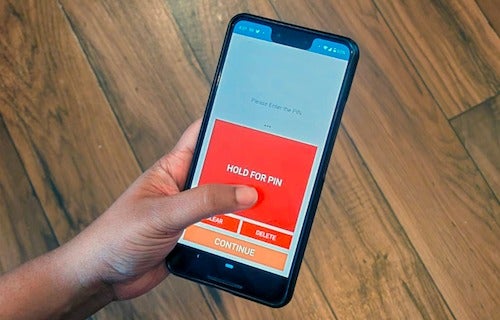
A person using the OneButtonPIN interface. Touching and holding the HOLD FOR PIN button triggers a vibration sequence. The user counts the vibrations and releases the finger to enter the desired PIN digit.
To evaluate the usability and accessibility of OneButtonPIN, the research team conducted a week-long diary study with nine participants.
“Overall, the authentication method we developed shows much promise,” Professor Watson said. “Using OneButtonPIN, participants entered PIN codes more quickly and with higher accuracy than with traditional PIN code entry interfaces.”
The team also evaluated the security of OneButtonPIN with nine blind and low-vision users to determine its resilience to shoulder surfing.
“In the security study, the main task required participants to guess the PIN code that was entered when using OneButtonPIN,” Professor Watson explained. “While traditional PIN entry methods often can be attacked successfully, the results of our security study showed that OneButtonPIN is exceptionally resilient to shoulder surfing attacks.”
Although designed with blind and low vision users in mind, the new authentication method could be useful to sighted people as well, said Professor Watson. “As OneButtonPIN is more resilient to shoulder surfing attacks than traditional PIN-based authentication, it could be used on-demand by sighted users in situations where they feel they are being observed.”
To learn more about the research on which this article is based, please see Manisha Kamarushi, Stacey L. Watson, Garreth W. Tigwell, and Roshan L. Peiris. OneButtonPIN: A Single Button Authentication Method for Blind and Low Vision Users to Improve Accessibility and Prevent Eavesdropping. Proceedings of the ACM Human Computer Interaction, 6, MHCI, Article 212 (September 2022).
Transform the future of work and other notes
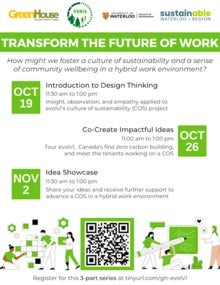 "Transform the Future of Work is a 3-part workshop series exploring how we might foster a culture of sustainability in a hybrid work environment," says a note from GreenHouse, VERiS, Sustainable Waterloo Region, and the Faculty of Environment. "Learn and apply the basics of design thinking in the context of evolv1, Canada’s first net-positive, multi-tenant office building. Participants will collaborate with key stakeholders to share ideas to drive the clean economy."
"Transform the Future of Work is a 3-part workshop series exploring how we might foster a culture of sustainability in a hybrid work environment," says a note from GreenHouse, VERiS, Sustainable Waterloo Region, and the Faculty of Environment. "Learn and apply the basics of design thinking in the context of evolv1, Canada’s first net-positive, multi-tenant office building. Participants will collaborate with key stakeholders to share ideas to drive the clean economy."
Register for this series by October 14.
 The University of Waterloo Staff Association (UWSA) is reminding its members that the electronic poll for the 2022-2023 UWSA Board of Directors is open now and will remain open until 4:30 p.m. today. There is no poll for President-elect as that position has been acclaimed.
The University of Waterloo Staff Association (UWSA) is reminding its members that the electronic poll for the 2022-2023 UWSA Board of Directors is open now and will remain open until 4:30 p.m. today. There is no poll for President-elect as that position has been acclaimed.
Candidate information, voting instructions, and an online ballot are located on the UWSA website.
The Conrad School of Entrepreneurship and Business is celebrating a major milestone on Saturday as it marks both the 20th intake of an MBET class and the 20th anniversary of the Conrad School itself. Events are scheduled throughout the entire day at Engineering 7 on Saturday, October 15 starting at 9:00 a.m. and running until 8:30 p.m. Congratulations.
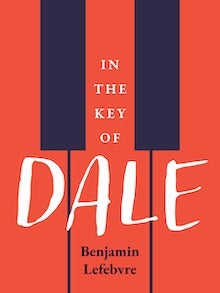 Benjamin Lefebvre, who works in the Centre for Extended Learning, has just released his first novel entitled In the Key of Dale. The book was published by Arsenal Pulp Press on October 11.
Benjamin Lefebvre, who works in the Centre for Extended Learning, has just released his first novel entitled In the Key of Dale. The book was published by Arsenal Pulp Press on October 11.
"In the Key of Dale is a disarming coming-of-age novel about a queer teen music prodigy who discovers pieces of himself in places he never thought to look," says the book's press release. "In the Key of Dale is a beguiling, pitch-perfect book about growing up, fitting in, and finding a way out of grief and loneliness toward the melodic light of adulthood."
There will be an in-person book launch in partnership with Words Worth Books on Saturday, October 15 at 2:00 p.m. at Trillium Church on Willow Street in Uptown Waterloo.
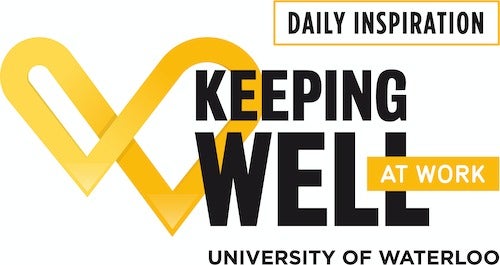
Here's today's Keeping Well at Work Daily Inspiration:
Commit to learning!
Take 10 minutes today to jot down your key learnings from Keeping Well at Work. Document not only what you want to do as a result of this learning but also how you will integrate these ideas into your day-to-day routine.
If you missed the event you can still benefit from the learning! You’ll soon be able to access the takeaways and some session recordings on the Organizational and Human Development Resource Zone. Log in using your WatIAM credentials.
Quest down for maintenance this weekend
Quest will be down for scheduled maintenance and unavailable on Saturday, October 15 from 6:45 a.m. to 11:00 a.m. and Sunday, October 16 from 6:45 a.m. to 11:00 a.m.
Link of the day
Day of the Defenders in Ukraine
When and Where to get support
Students can visit the Student Success Office online for supports including academic development, international student resources, immigration consulting, leadership development, exchange and study abroad, and opportunities to get involved.
Instructors looking for targeted support for developing online components for blended learning courses, transitioning remote to fully online courses, revising current online courses, and more please visit Agile Development | Centre for Extended Learning | University of Waterloo (uwaterloo.ca).
Instructors can visit the Keep Learning website to get support on adapting their teaching and learning plans for an online environment. Course templates are available within your course in LEARN to help you build and edit your content and assignment pages quickly. The KL team (CTE, CEL, ITMS, LIB) offers workshops, webinars and events.
Supports are available for employees returning to campus. Visit IST’s Hybrid Work and Technology guidelines and workplace protocols to assist with the transition.
Students with permanent, temporary and suspected disabilities and disabling conditions (medical conditions, injuries, or trauma from discrimination, violence, or oppression) can register with AccessAbility Services for academic accommodations (classroom accommodations, testing accommodations, milestone accommodations).
Instructors can visit AccessAbility Services' Faculty and Staff web page for information about the Instructor/Faculty role in the accommodation process. Instructors/ Faculty members are legally required to accommodate students with disabilities. AccessAbility Services (AAS) is here to help you understand your obligations, and to offer services and resources to help you facilitate accommodations.
The Writing and Communication Centre has in-person and virtual services to support grad and undergrad students, postdocs and faculty with any writing or communication project. Services include one-to-one appointments, drop-ins at Dana Porter Library, online workshops, writing groups, English conversation practice, and custom in-class workshops.
Co-op students can get help finding a job and find supports to successfully work remotely, develop new skills, access wellness and career information, and contact a co-op or career advisor.
The Centre for Career Action (CCA) has services and programs to support undergrads, grad students, postdocs, alumni, and employees in figuring out what they value, what they’re good at, and how to access meaningful work, co-op, volunteer, or graduate/professional school opportunities. Questions about CCA's services? Live chat, call 519-888-4047, or stop by our front desk in the Tatham Centre 8:30 a.m. to 4:30 p.m., Monday to Friday.
Drop-in to in-person Warrior Study Halls on Thursdays from 5:00 p.m. to 6:30 p.m. in DC and DP. Join a Peer Success Coach to set goals and work independently or in groups each week.
Renison's English Language Institute continues to offer virtual events and workshops to help students practice their English language skills.
If you feel overwhelmed or anxious and need to talk to somebody, please contact the University’s Campus Wellness services, either Health Services or Counselling Services. You can also contact the University's Centre for Mental Health Research and Treatment. Good2Talk is a post-secondary student helpline available to all students.
The Library is here to help, both in person and online. Our spaces are open for access to book stacks, study space, computers and printers, and the IST Help Desk. For in-depth support, meet one-to-one with Librarians, Special Collections & Archives and Geospatial Centre staff. Access our resources online for anywhere, anytime learning and research. Full details on current services and hours are available on the Library’s COVID-19 Update webpage.
The Faculty Association of the University of Waterloo (FAUW) continues to advocate for its members. Check out the FAUW blog for more information.
The University of Waterloo Staff Association (UWSA) continues to advocate for its members. Check out the UWSA blog for more information.
The Sexual Violence Prevention and Response Office (SVPRO) supports all members of the University of Waterloo campus community who have experienced, or been impacted, by sexual violence. This includes all students, staff, faculty and visitors on the main campus, the satellite campuses, and at the affiliated and federated Waterloo Institutes and Colleges. For support, email: svpro@uwaterloo.ca or visit the SVPRO website.
The Office of Indigenous Relations is a central hub that provides guidance, support, and resources to all Indigenous and non-Indigenous campus community members and oversees the University's Indigenization strategy.
The Waterloo Indigenous Student Centre, based at United College, provides support and resources for Indigenous students, and educational outreach programs for the broader community, including lectures, and events.
WUSA supports for students:
Peer support - MATES, Glow Centre, RAISE, Women’s Centre - Click on one of the links to book an appointment either in person or online for the term.
Food Support Service food hampers are currently available from the Turnkey Desk 24/7 in the Student Life Centre. Drop-off locations are also open again in SLC, DC, DP, SCH, and all residences.
Co-op Connection all available online.
Centre for Academic Policy Support - CAPS is here to assist Waterloo undergraduates throughout their experience in navigating academic policy in the instances of filing petitions, grievances and appeals. Please contact them at caps@wusa.ca.
WUSA Student Legal Protection Program - Seeking legal counsel can be intimidating, especially if it’s your first time facing a legal issue. The legal assistance helpline provides quick access to legal advice in any area of law, including criminal. Just call 1-833-202-4571.
Empower Me is a confidential mental health and wellness service that connects students with qualified counsellors 24/7. They can be reached at 1-833-628-5589.
GSA-UW supports for graduate students:
The Graduate Student Association (GSA-UW) supports students’ academic and social experience and promotes their well-being.
Advising and Support - The GSA advises graduate students experiencing challenges and can help with navigating university policies & filing a grievance, appeal, or petition.
Mental Health covered by the Health Plan - The GSA Health Plan now has an 80 per cent coverage rate (up to $800/year) for Mental Health Practitioners. Your plan includes coverage for psychologists, registered social workers, psychotherapists, and clinical counselors.
Dental Care - The GSA Dental Plan covers 60 to 70 per cent of your dental costs and by visiting dental professionals who are members of the Studentcare Networks, you can receive an additional 20 to 30 per cent coverage.
Student Legal Protection Program - Your GSA fees give you access to unlimited legal advice, accessible via a toll-free helpline: +1-833-202-4571. This advice covers topics including housing disputes, employment disputes, and disputes with an academic institution.
The Graduate House: Open Monday to Tuesday 11:30 a.m. to 7:00 p.m. and Wednesday to Friday 11:30 a.m. to 9:00 p.m. We’re open to all students, faculty, staff, and community members. The Graduate House is a community space run by the GSA-UW. We’re adding new items to the menu. Graduate students who paid their fees can get discounts and free coffee.
When and Where
Warriors vs. Laurier Blood Donation Battle. Join our “Waterloo Warriors” team on the Blood.ca website or app. #ItsInYouToGive
Warriors Game Day Tickets and Season Passes, on sale now. Cheer on your Warriors W/M Basketball, Football W/M Hockey and W/M Volleyball teams at home during the 2022-23 season. Purchase today.
Fall Reading Break, Saturday, October 8 to Sunday, October 16.
Warrior Basketball (Men’s/Women’s), Friday, October 14 to Sunday, October 16, Carl Totzke Court, PAC, Naismith Classic. Purchase Tickets.
See It Like A Student, Friday, October 14, drop-in tours between 10:00 a.m. to 3:00 p.m.
Waterloo at 100 faculty consultation, Friday, October 14, 2:30 p.m. to 3:30 p.m., virtual meeting (registration required).
Intellectual Property Presentation Series: IP101 & Commercialization, Friday, October 14, 1 to 3 p.m. Register to receive a Zoom link.
Warriors Men’s Hockey Home Opener vs Brock, Friday, October 14, 7:00 p.m., CIF Arena. Camps and Minor League Day (free tickets for youth wearing their hockey jerseys), The Alliance “We Are One” Game. Purchase Tickets.
Conrad School 20th Anniversary Celebration.Saturday, October 15, full day, in-person at Engineering 7, second floor. Registration required.
Vigil in Memory of Sarah Inam, Sunday, October 16, 2:00 p.m., Arts Quad.
NEW - Zero Waste Month campaign, Monday, October 17 to Monday, October 31.
NEW - University Senate meeting, Monday, October 17, 3:30 p.m., NH 3407.
NEW - Transform the Future of Work,Wednesday,October 19, 11:30 a.m. to 1:00 p.m. (UTD 164, GreenHouse); October 26, 11:00 a.m. to 1:00 p.m. (evolv1); and November 2, 11:30 a.m. to 1:00 p.m. (evolv1).
Future Cities Initiativeby Colin Ellard, The Urban Brain, Wednesday,October 19, 4:30 p.m.
NEW - Lectures in Catholic Experience featuring Dr. Tia Noelle Pratt, "Doing THE WORK: Anti-Racism and the Catholic Church," Wednesday, October 19, 7:30 p.m., Notre Dame Chapel, SJ1 Classrooms and Library Building.
2022 Hagey Lecture featuring Antoni Cimolino, Wednesday, October 19, 8:00 p.m., Theatre of the Arts.
WaterTalk: Challenges and opportunities for moving from the linear to the circular water cycle, presented by William A. Mitch, Stanford University. Thursday, October 20, 11:30 a.m. in DC 1302.
Quantum Opportunities and Showcase, Thursday, October 20, 9:00 a.m. - 4:30 p.m., Research Advancement Centre 2 (RAC 2).